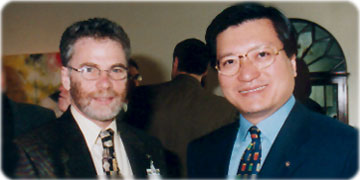 |






|
 |
 |
Executive Summary
Page 1 | Page 2 | Page
3 | Page 4
The Deliberations
Shaping Future Societies: The Digital and Biotech Revolutions
What parts of life will be changed most by the new technologies?
What social problems or conflicts will advancing technologies provoke?
What can a technologically transformed society offer as solutions?

Gregory Stock, Kriengsak Chareonwongsak
Dr. Gregory Stock, Director of the
Program on Medicine, Technology, and Society at the University of California,
Los Angeles opened the conference with strong words: "We are living in
a time of unprecedented change ... the technologies we are developing
today are ready to tear us from history." Life grows complexity, but through
a series of bursts, and we are on the verge of a change comparable with
the development of multicellular organisms. That change is the fusion
of technology with life, the effective creation of a global superorganism.
This change has consequences, and the two most important are conscious
reshaping of the earth's biosphere and turning technology back on ourselves,
transforming what we mean by human. The development of genetic technology
is completely embedded in mainstream medical research (e.g., curing disease,
fertility research, animal research, and the human genome project), and
attempting to stop be both impossible and immoral. The biggest divide
that genetic technology will likely produce is generational: we may be
terribly uncomfortable with these things, but our children probably won't
be. By controlling its evolution, humanity is about to leave its childhood.
Summary of Presentation
Dr. Moira Gunn laid out some important
numbers to consider when looking at the digital revolution: there are
200 million PCs in the world, but 12 billion microprocessors. The average
American encounters 72 microprocessors before lunch; 85% of working adult
Americans use a PC; 90% of US schools are connected in some way to the
internet; and 83% of US businesses have some form of internal computer
network. On the other hand, some 40% of American adults are technophobic,
with a further 10-20% mildly so. (The good news is that technophobia is
not related to performance with using computers as tools.) In sum, the
interconnectedness of almost all machines starts to look like the emergence
of a worldwide consciousness. This leads to four challenges:
- Privacy - balancing the rights of individuals, the needs of society,
and the desires of business
- Literacy - preliterate persons are excluded from this text-based consciousness
- Societal Protection - we have to find the technical means to be civilized
in cyberspace
- International Economy - the future is integrated, and everyone has to
come to terms with that.
Finally, despite all of the recent changes, people are still people. The
drives, desires, hopes and fears that have long been with us are not going
to go away any time soon.
Summary of Presentation
Highlights of the discussion that followed include:
Prof. Kriengsak Chareonwongsak - Their history may lead the Europeans
to worry more than other people about technology's advances. Asia is more
economically driven.
Dr. David Brin - As ambient levels of fear in a society fall, people can
broaden their horizons to think about problems more distant than the next
mean and about persons outside their immediate family circles. In the
United States, you see the effects of having had very low levels of fear
in society for up to three or four generations. What is the best way to
lower fear in a society? How can we foster competition that does not call
for the elimination of opponents?
Dr. Christof Erhart - Digitalization may let us see the arrival of efficiency
in govenment. It's important to remember, though, that in democracies
we may not get the "best" solution, but the most widely accepted one.
(Think of Windows and the Macintosh.) In a digital world, the question
arises about the diminishing importance of the body.
Dr. Hans Fleisch - What's really new in all these changes? Perhaps the
speed at which they are arriving. Our most important question is what
kind of world would we want to have as normal.
Go to the papers section to read summaries of
the comments.
Page 1 | Page 2 | Page
3 | Page 4
|
 |
